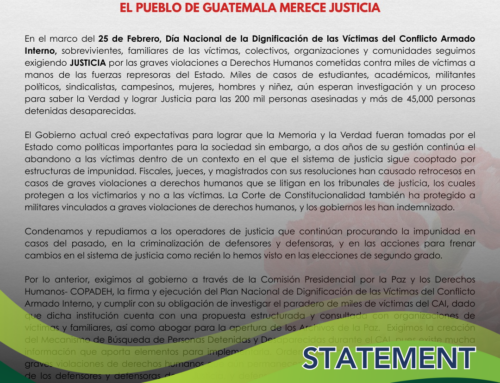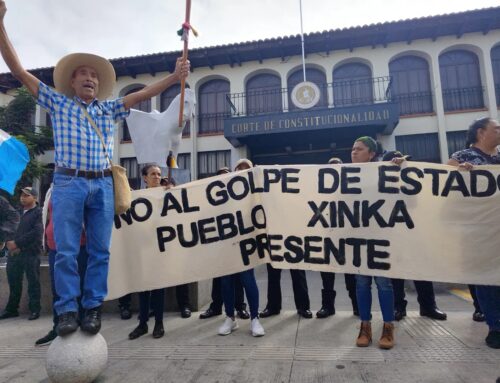NISGUA continues live coverage of the trial in Guatemala of Efraín Rios Montt and Mauricio Rodriguez Sánchez for genocide crimes against humanity. See our archive of live Twitter updates at @NISGUA_Guate.
Read our previous summaries: Day 1, Day 2, Day 3, Day 4/5 and full archive of ongoing live Twitter coverage.
Pedro del Barrio Caba:
(3/22, witness #10)
Francisco Oxlaj Gonzalez
“I came here to tell the truth. What I saw, I’m not inventing things. What I came here to share, I felt it in the living flesh, in my bones.”
(3/25, witness #42)
Francisco Pablo Carrillo
“They say we are here to lie, but we saw it with our own eyes.”
(3/25, witness #47)
“I’m here to speak about what happened, I’m not here to lie.”
(3/25, witness #48)
Juana Ramírez: I came here on my own.
(3/26, witness #57)
Defense lawyer Palomo: “How much do you want them to pay you?”
Prosecution objects.
Francisca Cecilia Barrera Mendez: “We want to be paid. Before we were well off, now we are poor.”
(3/26, witness #60)
 |
| Witness Domingo Santiago Cedillo sits before the court accompanied by an interpreter but he chose to give his testimony in Spanish, interrupted only by tears. |
One of the final testimonies today was a moving and emotionally charged account by Diego Santiago Cedillo, 33, who shared what he experienced as a little boy. Again, the witness insisted in the veracity of his truth:
I thought they would kill me but they didn’t, they took me. They took us to Finca La Perla. My uncle told me not to cry.
My mother came back but I didn’t want to go with her, I didn’t recognize her, she didn’t have clothes, she was crying.
My mother scolded us because we cried. Sometimes she covered our mouths so that we wouldn’t be found. Some died because their mouths were covered.
The soldiers came again and killed my brother and grandfather. I saw the bodies, crying, shaking. I didn’t have any desire to eat.
My brother was crying, my mother came back, my mother hugged me but I didn’t recognize her, she didn’t have any clothes, she was crying. I’ll always remember when I found my mother, my mother told me, I didn’t lose you because I was lazy, but because of the military. She said she loved me and she cried. My mother loved me. I’m not lying because I remember clearly.
She gave me food, only wild grasses, I remember, I’ll never forget, I’m not lying.
I will never forget what they did to my family. When I saw my mother she said, let’s go earn some pennies because we don’t have any money to eat. I didn’t have a father.
Every time I am in the fields I remember my father. I don’t remember him well, it’s like a dream, I remember a little. I’m not lying, that is what I am here to tell.
What does it mean for you to come here before these judges, before the people, to tell your story?
I’m here to testify so that we never experience this again in this life. I’m here to say, sometimes I can’t take the tears, the blood we’ve seen.
The trial will resume on April 1, after the Holy Week holiday is celebrated in Guatemala.






Leave A Comment